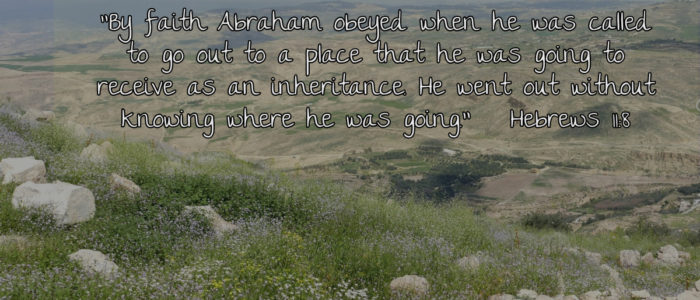How Being Sent Shapes Us
God Sends Us, But It’s Not Just For Other People’s Benefit.
These were great promises! Surely enough to entice anybody to embrace God’s call to leave home and pursue God’s mission! But Abraham quickly discovered that being sent by God was not exactly a pleasure tour. It involved the total examination and reshaping of his faith that would eventually lead to him growing into the man known as the “father of faith”.
What did it mean for Abraham to be sent? Well, it meant forsaking the comfortable settled life we might imagine he had like most people in Ur. He embraces the lifestyle of a wanderer- living in tents, amongst people who are foreigners. It means he chooses to abandon the lifestyle of idolatry which had marked the culture of Ur, as well as the cultures of people he was surrounded with in Canaan.
More than that- the promises which God had called him to seemed to be so elusive to him. God called him to go and live in Canaan- but the land had a famine. So what do you do when the land you’re called to is in the middle of famine? Abram’s answer was to take off and go to Egypt, a move that got him into all kinds of strife. God promised Abram he was going to have a nation of descendants, so many children that they would be like the stars of the sky. So what do you do when decades have gone by, and God hasn’t even given you one? Well, Abram’s solution was to take his wife’s servant Hagar and have a son through her. That was another decision which caused long years of heartache for him and his descendants.
Following the call of God to go was a call which was going to test Abraham to the hilt in his faith. But by the end of Abram’s life of following God’s sending call- Abraham had now learned to trust God implicitly, even if called upon to sacrifice the only son that God had delivered to him. He has become the father of faith.
He still hadn’t got many of the promises delivered in full. But he had become a man of God. God’s call for us to go, to be sent on his mission- is a call that will challenge us in lots of ways. Ultimately, it’s a call to go so that we might actually know God to a degree in which we never knew him before.
We may not get the great results which we dreamed of when we first start out in response to God’s call. But the pathway in going is about us getting to know God more. That’s the journey. The blessings will eventually follow in God’s time.
God sends us all because God is a sending God. For some, it is across the street into a neighbour’s home. For others, it is to a new village in Nepal or territory which has not been reached for Christ. For others, it means crossing over into a totally different country and culture. We all are called to go somewhere as representatives of Christ. And if we should choose to respond intelligently to that call, we will soon realise that we are being sent not just for the sake of others.
We are being sent so that we will be shaped into people who actually know and trust and love God in an ever increasingly profound way. That is what the journey of being sent is really about.


Comments are closed.